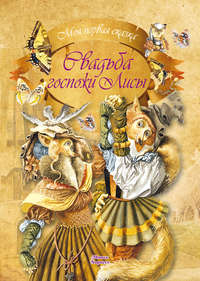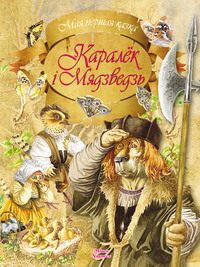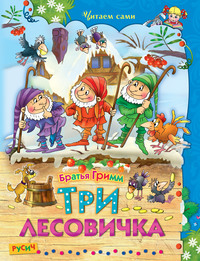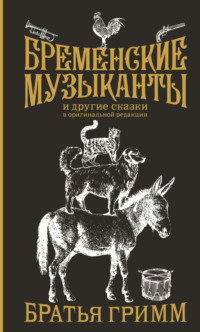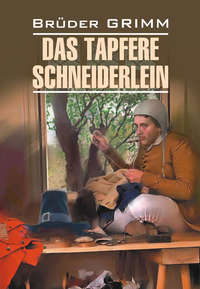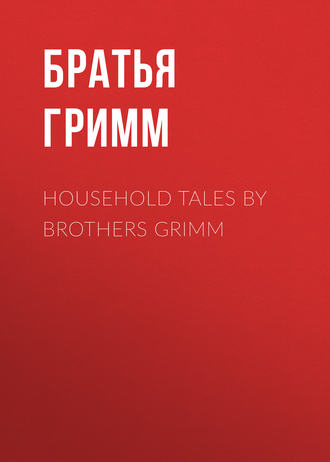 полная версия
полная версияHousehold Tales by Brothers Grimm
One day she said to her, "Here are twelve pounds of feathers which thou must pick, and if they are not done this evening, thou mayst expect a good beating. Dost thou imagine thou art to idle away the whole day?" The poor girl sat down to the work, but tears ran down her cheeks as she did so, for she saw plainly enough that it was quite impossible to finish the work in one day. Whenever she had a little heap of feathers lying before her, and she sighed or smote her hands together in her anguish, they flew away, and she had to pick them out again, and begin her work anew. Then she put her elbows on the table, laid her face in her two hands, and cried, "Is there no one, then, on God's earth to have pity on me?" Then she heard a low voice which said, "Be comforted, my child, I have come to help thee." The maiden looked up, and an old woman was by her side. She took the girl kindly by the hand, and said, "Only tell me what is troubling thee." As she spoke so kindly, the girl told her of her miserable life, and how one burden after another was laid upon her, and she never could get to the end of the work which was given to her. "If I have not done these feathers by this evening, my step-mother will beat me; she has threatened she will, and I know she keeps her word." Her tears began to flow again, but the good old woman said, "Do not be afraid, my child; rest a while, and in the meantime I will look to thy work." The girl lay down on her bed, and soon fell asleep. The old woman seated herself at the table with the feathers, and how they did fly off the quills, which she scarcely touched with her withered hands! The twelve pounds were soon finished, and when the girl awoke, great snow-white heaps were lying, piled up, and everything in the room was neatly cleared away, but the old woman had vanished. The maiden thanked God, and sat still till evening came, when the step-mother came in and marvelled to see the work completed. "Just look, you awkward creature," said she, "what can be done when people are industrious; and why couldst thou not set about something else? There thou sittest with thy hands crossed." When she went out she said, "The creature is worth more than her salt. I must give her some work that is still harder."
Next morning she called the girl, and said, "There is a spoon for thee; with that thou must empty out for me the great pond which is beside the garden, and if it is not done by night, thou knowest what will happen." The girl took the spoon, and saw that it was full of holes; but even if it had not been, she never could have emptied the pond with it. She set to work at once, knelt down by the water, into which her tears were falling, and began to empty it. But the good old woman appeared again, and when she learnt the cause of her grief, she said, "Be of good cheer, my child. Go into the thicket and lie down and sleep; I will soon do thy work." As soon as the old woman was alone, she barely touched the pond, and a vapour rose up on high from the water, and mingled itself with the clouds. Gradually the pond was emptied, and when the maiden awoke before sunset and came thither, she saw nothing but the fishes which were struggling in the mud. She went to her step-mother, and showed her that the work was done. "It ought to have been done long before this," said she, and grew white with anger, but she meditated something new.
On the third morning she said to the girl, "Thou must build me a castle on the plain there, and it must be ready by the evening." The maiden was dismayed, and said, "How can I complete such a great work?" "I will endure no opposition," screamed the step-mother. "If thou canst empty a pond with a spoon that is full of holes, thou canst build a castle too. I will take possession of it this very day, and if anything is wanting, even if it be the most trifling thing in the kitchen or cellar, thou knowest what lies before thee!" She drove the girl out, and when she entered the valley, the rocks were there, piled up one above the other, and all her strength would not have enabled her even to move the very smallest of them. She sat down and wept, and still she hoped the old woman would help her. The old woman was not long in coming; she comforted her and said, "Lie down there in the shade and sleep, and I will soon build the castle for thee. If it would be a pleasure to thee, thou canst live in it thyself." When the maiden had gone away, the old woman touched the gray rocks. They began to rise, and immediately moved together as if giants had built the walls; and on these the building arose, and it seemed as if countless hands were working invisibly, and placing one stone upon another. There was a dull heavy noise from the ground; pillars arose of their own accord on high, and placed themselves in order near each other. The tiles laid themselves in order on the roof, and when noon-day came, the great weather-cock was already turning itself on the summit of the tower, like a golden figure of the Virgin with fluttering garments. The inside of the castle was being finished while evening was drawing near. How the old woman managed it, I know not; but the walls of the rooms were hung with silk and velvet, embroidered chairs were there, and richly ornamented arm-chairs by marble tables; crystal chandeliers hung down from the ceilings, and mirrored themselves in the smooth pavement; green parrots were there in gilt cages, and so were strange birds which sang most beautifully, and there was on all sides as much magnificence as if a king were going to live there. The sun was just setting when the girl awoke, and the brightness of a thousand lights flashed in her face. She hurried to the castle, and entered by the open door. The steps were spread with red cloth, and the golden balustrade beset with flowering trees. When she saw the splendour of the apartment, she stood as if turned to stone. Who knows how long she might have stood there if she had not remembered the step-mother? "Alas!" she said to herself, "if she could but be satisfied at last, and would give up making my life a misery to me." The girl went and told her that the castle was ready. "I will move into it at once," said she, and rose from her seat. When they entered the castle, she was forced to hold her hand before her eyes, the brilliancy of everything was so dazzling. "Thou seest," said she to the girl, "how easy it has been for thee to do this; I ought to have given thee something harder." She went through all the rooms, and examined every corner to see if anything was wanting or defective; but she could discover nothing. "Now we will go down below," said she, looking at the girl with malicious eyes. "The kitchen and the cellar still have to be examined, and if thou hast forgotten anything thou shalt not escape thy punishment." But the fire was burning on the hearth, and the meat was cooking in the pans, the tongs and shovel were leaning against the wall, and the shining brazen utensils all arranged in sight. Nothing was wanting, not even a coal-box and water-pail. "Which is the way to the cellar?" she cried. "If that is not abundantly filled, it shall go ill with thee." She herself raised up the trap-door and descended; but she had hardly made two steps before the heavy trap-door which was only laid back, fell down. The girl heard a scream, lifted up the door very quickly to go to her aid, but she had fallen down, and the girl found her lying lifeless at the bottom.
And now the magnificent castle belonged to the girl alone. She at first did not know how to reconcile herself to her good fortune. Beautiful dresses were hanging in the wardrobes, the chests were filled with gold or silver, or with pearls and jewels, and she never felt a desire that she was not able to gratify. And soon the fame of the beauty and riches of the maiden went over all the world. Wooers presented themselves daily, but none pleased her. At length the son of the King came and he knew how to touch her heart, and she betrothed herself to him. In the garden of the castle was a lime-tree, under which they were one day sitting together, when he said to her, "I will go home and obtain my father's consent to our marriage. I entreat thee to wait for me here under this lime-tree, I shall be back with thee in a few hours." The maiden kissed him on his left cheek, and said, "Keep true to me, and never let any one else kiss thee on this cheek. I will wait here under the lime-tree until thou returnest."
The maid stayed beneath the lime-tree until sunset, but he did not return. She sat three days from morning till evening, waiting for him, but in vain. As he still was not there by the fourth day, she said, "Some accident has assuredly befallen him. I will go out and seek him, and will not come back until I have found him." She packed up three of her most beautiful dresses, one embroidered with bright stars, the second with silver moons, the third with golden suns, tied up a handful of jewels in her handkerchief, and set out. She inquired everywhere for her betrothed, but no one had seen him; no one knew anything about him. Far and wide did she wander through the world, but she found him not. At last she hired herself to a farmer as a cow-herd, and buried her dresses and jewels beneath a stone.
And now she lived as a herdswoman, guarded her herd, and was very sad and full of longing for her beloved one; she had a little calf which she taught to know her, and fed it out of her own hand, and when she said,
"Little calf, little calf, kneel by my side, And do not forget thy shepherd-maid, As the prince forgot his betrothed bride, Who waited for him 'neath the lime-tree's shade."
the little calf knelt down, and she stroked it.
And when she had lived for a couple of years alone and full of grief, a report was spread over all the land that the King's daughter was about to celebrate her marriage. The road to the town passed through the village where the maiden was living, and it came to pass that once when the maiden was driving out her herd, her bridegroom travelled by. He was sitting proudly on his horse, and never looked round, but when she saw him she recognized her beloved, and it was just as if a sharp knife had pierced her heart. "Alas!" said she, "I believed him true to me, but he has forgotten me."
Next day he again came along the road. When he was near her she said to the little calf,
"Little calf, little calf, kneel by my side, And do not forget thy shepherd-maid, As the prince forgot his betrothed bride, Who waited for him 'neath the lime-tree's shade."
When he was aware of the voice, he looked down and reined in his horse. He looked into the herd's face, and then put his hands before his eyes as if he were trying to remember something, but he soon rode onwards and was out of sight. "Alas!" said she, "he no longer knows me," and her grief was ever greater.
Soon after this a great festival three days long was to be held at the King's court, and the whole country was invited to it.
"Now will I try my last chance," thought the maiden, and when evening came she went to the stone under which she had buried her treasures. She took out the dress with the golden suns, put it on, and adorned herself with the jewels. She let down her hair, which she had concealed under a handkerchief, and it fell down in long curls about her, and thus she went into the town, and in the darkness was observed by no one. When she entered the brightly-lighted hall, every one started back in amazement, but no one knew who she was. The King's son went to meet her, but he did not recognize her. He led her out to dance, and was so enchanted with her beauty, that he thought no more of the other bride. When the feast was over, she vanished in the crowd, and hastened before daybreak to the village, where she once more put on her herd's dress.
Next evening she took out the dress with the silver moons, and put a half-moon made of precious stones in her hair. When she appeared at the festival, all eyes were turned upon her, but the King's son hastened to meet her, and filled with love for her, danced with her alone, and no longer so much as glanced at anyone else. Before she went away she was forced to promise him to come again to the festival on the last evening.
When she appeared for the third time, she wore the star-dress which sparkled at every step she took, and her hair-ribbon and girdle were starred with jewels. The prince had already been waiting for her for a long time, and forced his way up to her. "Do but tell who thou art," said he, "I feel just as if I had already known thee a long time." "Dost thou not know what I did when thou leftest me?" Then she stepped up to him, and kissed him on his left cheek, and in a moment it was as if scales fell from his eyes, and he recognized the true bride. "Come," said he to her, "here I stay no longer," gave her his hand, and led her down to the carriage. The horses hurried away to the magic castle as if the wind had been harnessed to the carriage. The illuminated windows already shone in the distance. When they drove past the lime-tree, countless glow-worms were swarming about it. It shook its branches, and sent forth their fragrance. On the steps flowers were blooming, and the room echoed with the song of strange birds, but in the hall the entire court was assembled, and the priest was waiting to marry the bridegroom to the true bride.
187 The Hare and the Hedgehog
This story, my dear young folks, seems to be false, but it really is true, for my grandfather, from whom I have it, used always, when relating it, to say complacently, "It must be true, my son, or else no one could tell it to you." The story is as follows. One Sunday morning about harvest time, just as the buckwheat was in bloom, the sun was shining brightly in heaven, the east wind was blowing warmly over the stubble-fields, the larks were singing in the air, the bees buzzing among the buckwheat, the people were all going in their Sunday clothes to church, and all creatures were happy, and the hedgehog was happy too.
The hedgehog, however, was standing by his door with his arms akimbo, enjoying the morning breezes, and slowly trilling a little song to himself, which was neither better nor worse than the songs which hedgehogs are in the habit of singing on a blessed Sunday morning. Whilst he was thus singing half aloud to himself, it suddenly occurred to him that, while his wife was washing and drying the children, he might very well take a walk into the field, and see how his turnips were going on. The turnips were, in fact, close beside his house, and he and his family were accustomed to eat them, for which reason he looked upon them as his own. No sooner said than done. The hedgehog shut the house-door behind him, and took the path to the field. He had not gone very far from home, and was just turning round the sloe-bush which stands there outside the field, to go up into the turnip-field, when he observed the hare who had gone out on business of the same kind, namely, to visit his cabbages. When the hedgehog caught sight of the hare, he bade him a friendly good morning. But the hare, who was in his own way a distinguished gentleman, and frightfully haughty, did not return the hedgehog's greeting, but said to him, assuming at the same time a very contemptuous manner, "How do you happen to be running about here in the field so early in the morning?" "I am taking a walk," said the hedgehog. "A walk!" said the hare, with a smile. "It seems to me that you might use your legs for a better purpose." This answer made the hedgehog furiously angry, for he can bear anything but an attack on his legs, just because they are crooked by nature. So now the hedgehog said to the hare, "You seem to imagine that you can do more with your legs than I with mine." "That is just what I do think," said the hare. "That can be put to the test," said the hedgehog. "I wager that if we run a race, I will outstrip you." "That is ridiculous! You with your short legs!" said the hare, "but for my part I am willing, if you have such a monstrous fancy for it. What shall we wager?" "A golden louis-d'or and a bottle of brandy," said the hedgehog. "Done," said the hare. "Shake hands on it, and then we may as well come off at once." "Nay," said the hedgehog, "there is no such great hurry! I am still fasting, I will go home first, and have a little breakfast. In half-an-hour I will be back again at this place."
Hereupon the hedgehog departed, for the hare was quite satisfied with this. On his way the hedgehog thought to himself, "The hare relies on his long legs, but I will contrive to get the better of him. He may be a great man, but he is a very silly fellow, and he shall pay for what he has said." So when the hedgehog reached home, he said to his wife, "Wife, dress thyself quickly, thou must go out to the field with me." "What is going on, then?" said his wife. "I have made a wager with the hare, for a gold louis-d'or and a bottle of brandy. I am to run a race with him, and thou must be present." "Good heavens, husband," the wife now cried, "art thou not right in thy mind, hast thou completely lost thy wits? What can make thee want to run a race with the hare?" "Hold thy tongue, woman," said the hedgehog, "that is my affair. Don't begin to discuss things which are matters for men. Be off, dress thyself, and come with me." What could the hedgehog's wife do? She was forced to obey him, whether she liked it or not.
So when they had set out on their way together, the hedgehog said to his wife, "Now pay attention to what I am going to say. Look you, I will make the long field our race-course. The hare shall run in one furrow, and I in another, and we will begin to run from the top. Now all that thou hast to do is to place thyself here below in the furrow, and when the hare arrives at the end of the furrow, on the other side of thee, thou must cry out to him, 'I am here already!'"
Then they reached the field, and the hedgehog showed his wife her place, and then walked up the field. When he reached the top, the hare was already there. "Shall we start?" said the hare. "Certainly," said the hedgehog. "Then both at once." So saying, each placed himself in his own furrow. The hare counted, "Once, twice, thrice, and away!" and went off like a whirlwind down the field. The hedgehog, however, only ran about three paces, and then he stooped down in the furrow, and stayed quietly where he was. When the hare therefore arrived in full career at the lower end of the field, the hedgehog's wife met him with the cry, "I am here already!" The hare was shocked and wondered not a little, he thought no other than that it was the hedgehog himself who was calling to him, for the hedgehog's wife looked just like her husband. The hare, however, thought to himself, "That has not been done fairly," and cried, "It must be run again, let us have it again." And once more he went off like the wind in a storm, so that he seemed to fly. But the hedgehog's wife stayed quietly in her place. So when the hare reached the top of the field, the hedgehog himself cried out to him, "I am here already." The hare, however, quite beside himself with anger, cried, "It must be run again, we must have it again." "All right," answered the hedgehog, "for my part we'll run as often as you choose." So the hare ran seventy-three times more, and the hedgehog always held out against him, and every time the hare reached either the top or the bottom, either the hedgehog or his wife said, "I am here already."
At the seventy-fourth time, however, the hare could no longer reach the end. In the middle of the field he fell to the ground, blood streamed out of his mouth, and he lay dead on the spot. But the hedgehog took the louis-d'or which he had won and the bottle of brandy, called his wife out of the furrow, and both went home together in great delight, and if they are not dead, they are living there still.
This is how it happened that the hedgehog made the hare run races with him on the Buxtehuder heath till he died, and since that time no hare has ever had any fancy for running races with a Buxtehuder hedgehog.
The moral of this story, however, is, firstly, that no one, however great he may be, should permit himself to jest at any one beneath him, even if he be only a hedgehog. And, secondly, it teaches, that when a man marries, he should take a wife in his own position, who looks just as he himself looks. So whosoever is a hedgehog let him see to it that his wife is a hedgehog also, and so forth.
188 The Spindle, The Shuttle, and the Needle
There was once a girl whose father and mother died while she was still a little child. All alone, in a small house at the end of the village, dwelt her godmother, who supported herself by spinning, weaving, and sewing. The old woman took the forlorn child to live with her, kept her to her work, and educated her in all that is good. When the girl was fifteen years old, the old woman became ill, called the child to her bedside, and said, "Dear daughter, I feel my end drawing near. I leave thee the little house, which will protect thee from wind and weather, and my spindle, shuttle, and needle, with which thou canst earn thy bread." Then she laid her hands on the girl's head, blessed her, and said, "Only preserve the love of God in thy heart, and all will go well with thee." Thereupon she closed her eyes, and when she was laid in the earth, the maiden followed the coffin, weeping bitterly, and paid her the last mark of respect. And now the maiden lived quite alone in the little house, and was industrious, and span, wove, and sewed, and the blessing of the good old woman was on all that she did. It seemed as if the flax in the room increased of its own accord, and whenever she wove a piece of cloth or carpet, or had made a shirt, she at once found a buyer who paid her amply for it, so that she was in want of nothing, and even had something to share with others.
About this time, the son of the King was travelling about the country looking for a bride. He was not to choose a poor one, and did not want to have a rich one. So he said, "She shall be my wife who is the poorest, and at the same time the richest." When he came to the village where the maiden dwelt, he inquired, as he did wherever he went, who was the richest and also the poorest girl in the place? They first named the richest; the poorest, they said, was the girl who lived in the small house quite at the end of the village. The rich girl was sitting in all her splendour before the door of her house, and when the prince approached her, she got up, went to meet him, and made him a low curtsey. He looked at her, said nothing, and rode on. When he came to the house of the poor girl, she was not standing at the door, but sitting in her little room. He stopped his horse, and saw through the window, on which the bright sun was shining, the girl sitting at her spinning-wheel, busily spinning. She looked up, and when she saw that the prince was looking in, she blushed all over her face, let her eyes fall, and went on spinning. I do not know whether, just at that moment, the thread was quite even; but she went on spinning until the King's son had ridden away again. Then she went to the window, opened it, and said, "It is so warm in this room!" but she still looked after him as long as she could distinguish the white feathers in his hat. Then she sat down to work again in her own room and went on with her spinning, and a saying which the old woman had often repeated when she was sitting at her work, came into her mind, and she sang these words to herself, —
"Spindle, my spindle, haste, haste thee away, And here to my house bring the wooer, I pray."And what do you think happened? The spindle sprang out of her hand in an instant, and out of the door, and when, in her astonishment, she got up and looked after it, she saw that it was dancing out merrily into the open country, and drawing a shining golden thread after it. Before long, it had entirely vanished from her sight. As she had now no spindle, the girl took the weaver's shuttle in her hand, sat down to her loom, and began to weave.
The spindle, however, danced continually onwards, and just as the thread came to an end, reached the prince. "What do I see?" he cried; "the spindle certainly wants to show me the way!" turned his horse about, and rode back with the golden thread. The girl was, however, sitting at her work singing,
"Shuttle, my shuttle, weave well this day, And guide the wooer to me, I pray."Immediately the shuttle sprang out of her hand and out by the door. Before the threshold, however, it began to weave a carpet which was more beautiful than the eyes of man had ever yet beheld. Lilies and roses blossomed on both sides of it, and on a golden ground in the centre green branches ascended, under which bounded hares and rabbits, stags and deer stretched their heads in between them, brightly-coloured birds were sitting in the branches above; they lacked nothing but the gift of song. The shuttle leapt hither and thither, and everything seemed to grow of its own accord.


